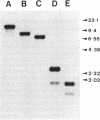Abstract
The energy-dependent transport of solutes across the vacuolar membrane (tonoplast) of plant cells is driven by two H+ pumps: a vacuolar ("V-type") H(+)-ATPase (EC 3.6.1.3) and a H(+)-translocating (pyrophosphate-energized) inorganic pyrophosphatase (H(+)-PPase; EC 3.6.1.1). The H(+)-PPase, like the V-type H(+)-ATPase, is abundant and ubiquitous in the vacuolar membranes of plant cells, and both enzymes make a substantial contribution to the transtonoplast H(+)-electrochemical potential difference. Here, we report the cloning and sequence of cDNAs encoding the tonoplast H(+)-PPase of Arabidopsis thaliana. The protein predicted from the nucleotide sequence of the cDNAs is constituted of 770 amino acids and has a molecular weight of 80,800. It is a highly hydrophobic integral membrane protein, and the structure derived from hydrophilicity plots contains at least 13 transmembrane spans. Since the tonoplast H(+)-PPase appears to be constituted of one polypeptide species and genomic Southern analyses indicate that the gene encoding the Mr 80,800 polypeptide is present in only a single copy in the genome of Arabidopsis, it is suggested that the H(+)-PPase has been cloned in its entirety. The lack of sequence identities between the tonoplast H(+)-PPase and any other characterized H+ pump or PPi-dependent enzyme implies a different evolutionary origin for this translocase.
Full text
PDF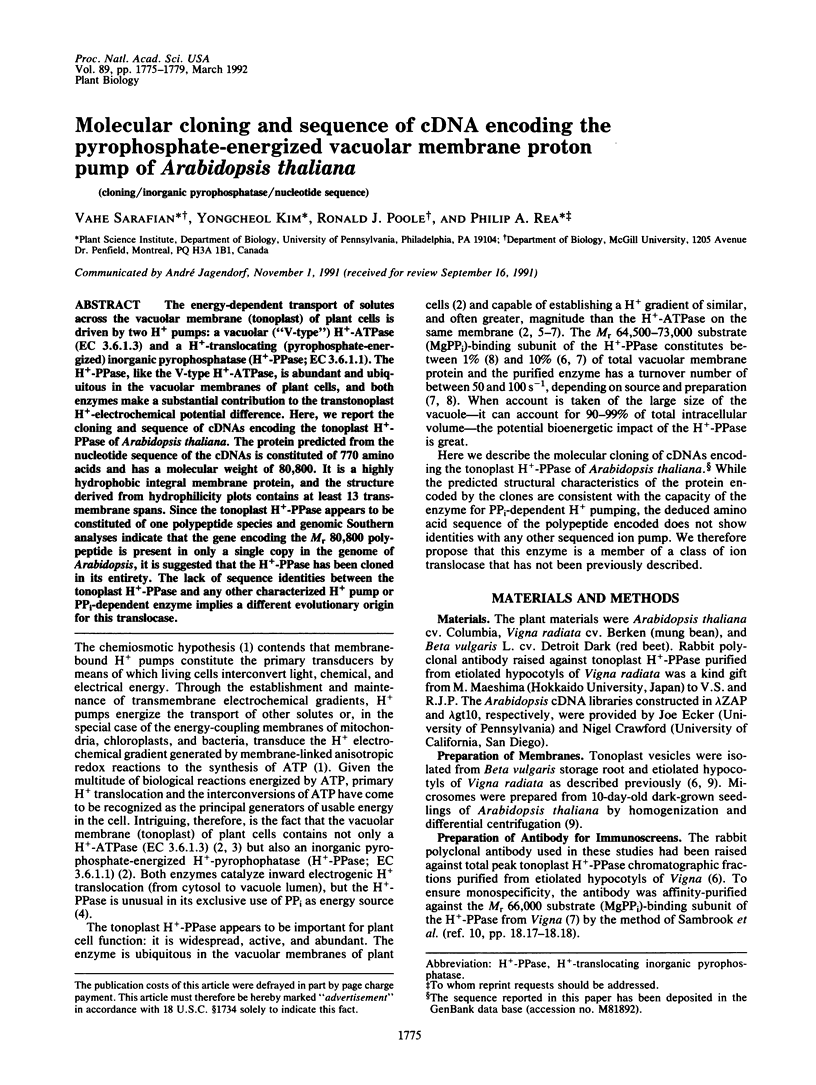
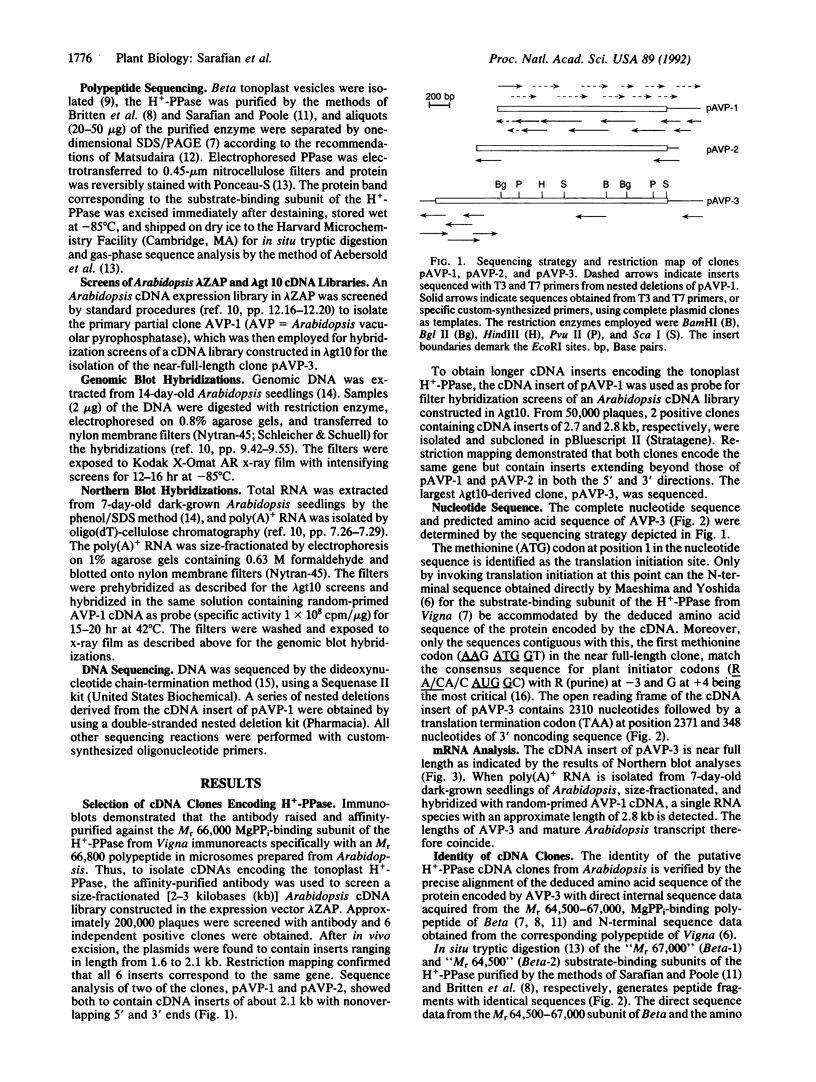
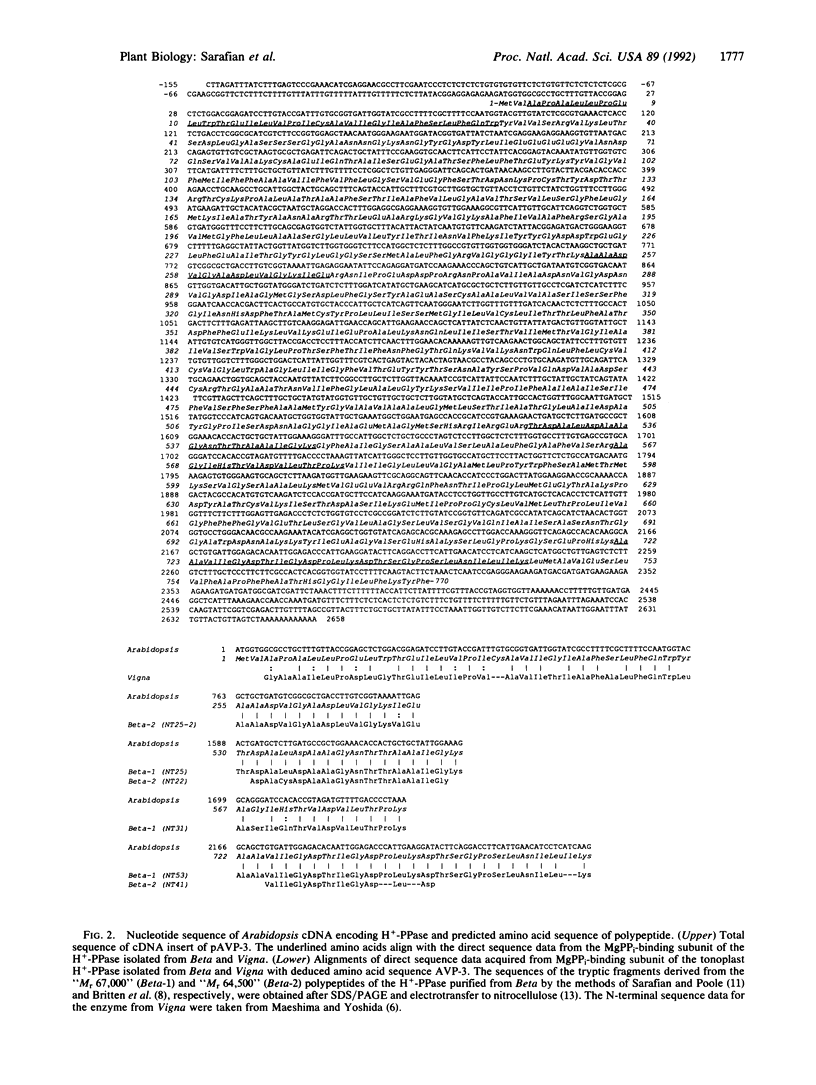
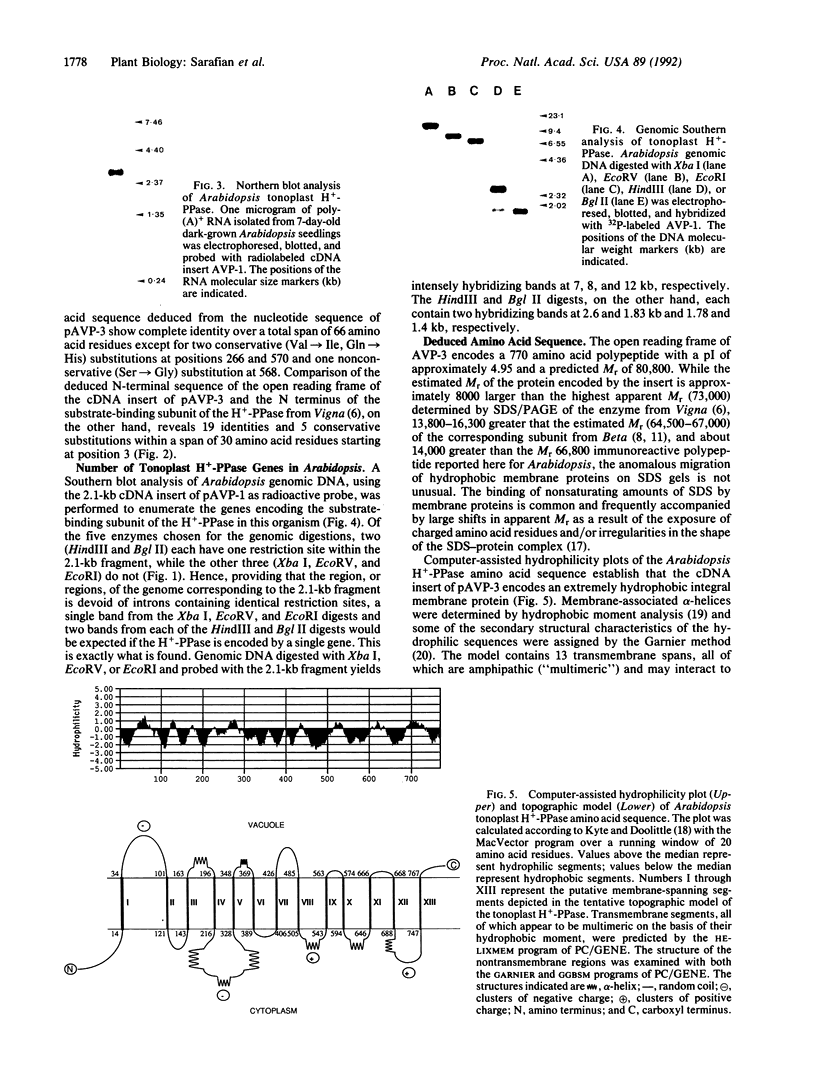
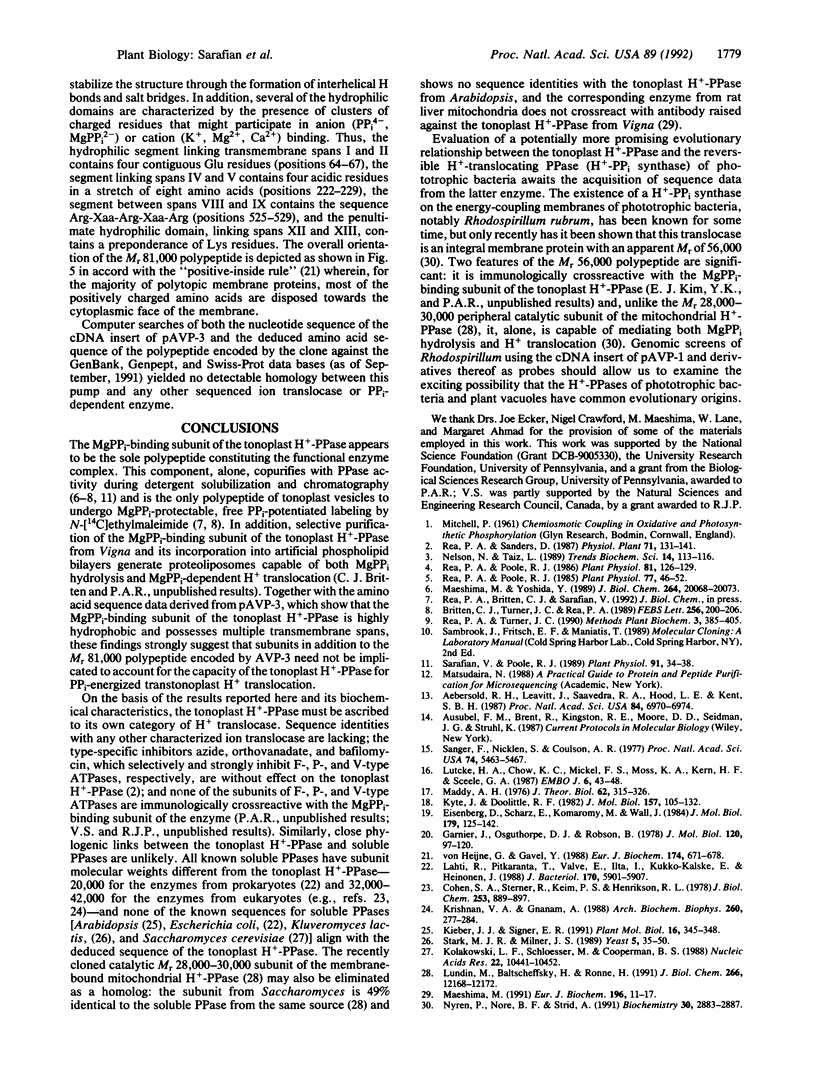
Images in this article
Selected References
These references are in PubMed. This may not be the complete list of references from this article.
- Aebersold R. H., Leavitt J., Saavedra R. A., Hood L. E., Kent S. B. Internal amino acid sequence analysis of proteins separated by one- or two-dimensional gel electrophoresis after in situ protease digestion on nitrocellulose. Proc Natl Acad Sci U S A. 1987 Oct;84(20):6970–6974. doi: 10.1073/pnas.84.20.6970. [DOI] [PMC free article] [PubMed] [Google Scholar]
- Cohen S. A., Sterner R., Keim P. S., Heinrikson R. L. Covalent structural analysis of yeast inorganic pyrophosphatase. J Biol Chem. 1978 Feb 10;253(3):889–897. [PubMed] [Google Scholar]
- Eisenberg D., Schwarz E., Komaromy M., Wall R. Analysis of membrane and surface protein sequences with the hydrophobic moment plot. J Mol Biol. 1984 Oct 15;179(1):125–142. doi: 10.1016/0022-2836(84)90309-7. [DOI] [PubMed] [Google Scholar]
- Garnier J., Osguthorpe D. J., Robson B. Analysis of the accuracy and implications of simple methods for predicting the secondary structure of globular proteins. J Mol Biol. 1978 Mar 25;120(1):97–120. doi: 10.1016/0022-2836(78)90297-8. [DOI] [PubMed] [Google Scholar]
- Kieber J. J., Signer E. R. Cloning and characterization of an inorganic pyrophosphatase gene from Arabidopsis thaliana. Plant Mol Biol. 1991 Feb;16(2):345–348. doi: 10.1007/BF00020567. [DOI] [PubMed] [Google Scholar]
- Kolakowski L. F., Jr, Schloesser M., Cooperman B. S. Cloning, molecular characterization and chromosome localization of the inorganic pyrophosphatase (PPA) gene from S. cerevisiae. Nucleic Acids Res. 1988 Nov 25;16(22):10441–10452. doi: 10.1093/nar/16.22.10441. [DOI] [PMC free article] [PubMed] [Google Scholar]
- Krishnan V. A., Gnanam A. Properties and regulation of Mg2+-dependent chloroplast inorganic pyrophosphatase from Sorghum vulgare leaves. Arch Biochem Biophys. 1988 Jan;260(1):277–284. doi: 10.1016/0003-9861(88)90451-1. [DOI] [PubMed] [Google Scholar]
- Kyte J., Doolittle R. F. A simple method for displaying the hydropathic character of a protein. J Mol Biol. 1982 May 5;157(1):105–132. doi: 10.1016/0022-2836(82)90515-0. [DOI] [PubMed] [Google Scholar]
- Lahti R., Pitkäranta T., Valve E., Ilta I., Kukko-Kalske E., Heinonen J. Cloning and characterization of the gene encoding inorganic pyrophosphatase of Escherichia coli K-12. J Bacteriol. 1988 Dec;170(12):5901–5907. doi: 10.1128/jb.170.12.5901-5907.1988. [DOI] [PMC free article] [PubMed] [Google Scholar]
- Lundin M., Baltscheffsky H., Ronne H. Yeast PPA2 gene encodes a mitochondrial inorganic pyrophosphatase that is essential for mitochondrial function. J Biol Chem. 1991 Jul 5;266(19):12168–12172. [PubMed] [Google Scholar]
- Lütcke H. A., Chow K. C., Mickel F. S., Moss K. A., Kern H. F., Scheele G. A. Selection of AUG initiation codons differs in plants and animals. EMBO J. 1987 Jan;6(1):43–48. doi: 10.1002/j.1460-2075.1987.tb04716.x. [DOI] [PMC free article] [PubMed] [Google Scholar]
- Maddy A. H. A critical evaluation of the analysis of membrane proteins by polyacrylamide gel electrophoresis in the presence of dodecyl sulphate. J Theor Biol. 1976 Oct 21;62(2):315–326. doi: 10.1016/0022-5193(76)90123-5. [DOI] [PubMed] [Google Scholar]
- Maeshima M. H(+)-translocating inorganic pyrophosphatase of plant vacuoles. Inhibition by Ca2+, stabilization by Mg2+ and immunological comparison with other inorganic pyrophosphatases. Eur J Biochem. 1991 Feb 26;196(1):11–17. doi: 10.1111/j.1432-1033.1991.tb15779.x. [DOI] [PubMed] [Google Scholar]
- Maeshima M., Yoshida S. Purification and properties of vacuolar membrane proton-translocating inorganic pyrophosphatase from mung bean. J Biol Chem. 1989 Nov 25;264(33):20068–20073. [PubMed] [Google Scholar]
- Nelson N., Taiz L. The evolution of H+-ATPases. Trends Biochem Sci. 1989 Mar;14(3):113–116. doi: 10.1016/0968-0004(89)90134-5. [DOI] [PubMed] [Google Scholar]
- Nyrén P., Nore B. F., Strid A. Proton-pumping N,N'-dicyclohexylcarbodiimide-sensitive inorganic pyrophosphate synthase from Rhodospirillum rubrum: purification, characterization, and reconstitution. Biochemistry. 1991 Mar 19;30(11):2883–2887. doi: 10.1021/bi00225a022. [DOI] [PubMed] [Google Scholar]
- Rea P. A., Poole R. J. Chromatographic resolution of h-translocating pyrophosphatase from h-translocating ATPase of higher plant tonoplast. Plant Physiol. 1986 May;81(1):126–129. doi: 10.1104/pp.81.1.126. [DOI] [PMC free article] [PubMed] [Google Scholar]
- Rea P. A., Poole R. J. Proton-Translocating Inorganic Pyrophosphatase in Red Beet (Beta vulgaris L.) Tonoplast Vesicles. Plant Physiol. 1985 Jan;77(1):46–52. doi: 10.1104/pp.77.1.46. [DOI] [PMC free article] [PubMed] [Google Scholar]
- Sanger F., Nicklen S., Coulson A. R. DNA sequencing with chain-terminating inhibitors. Proc Natl Acad Sci U S A. 1977 Dec;74(12):5463–5467. doi: 10.1073/pnas.74.12.5463. [DOI] [PMC free article] [PubMed] [Google Scholar]
- Sarafian V., Poole R. J. Purification of an h-translocating inorganic pyrophosphatase from vacuole membranes of red beet. Plant Physiol. 1989 Sep;91(1):34–38. doi: 10.1104/pp.91.1.34. [DOI] [PMC free article] [PubMed] [Google Scholar]
- Stark M. J., Milner J. S. Cloning and analysis of the Kluyveromyces lactis TRP1 gene: a chromosomal locus flanked by genes encoding inorganic pyrophosphatase and histone H3. Yeast. 1989 Jan-Feb;5(1):35–50. doi: 10.1002/yea.320050106. [DOI] [PubMed] [Google Scholar]
- von Heijne G., Gavel Y. Topogenic signals in integral membrane proteins. Eur J Biochem. 1988 Jul 1;174(4):671–678. doi: 10.1111/j.1432-1033.1988.tb14150.x. [DOI] [PubMed] [Google Scholar]



